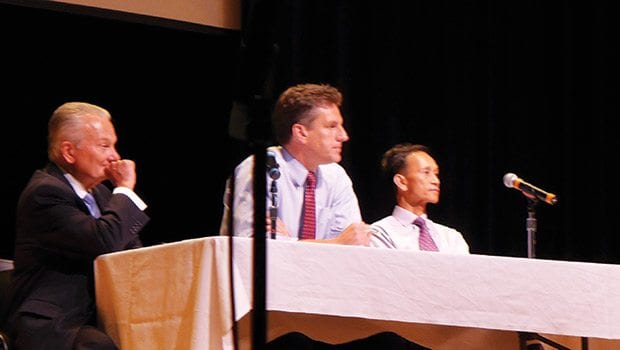
As Governor Charlie Baker works on his economic development agenda for the commonwealth, his office continues to solicit opinions from state residents. Last week, a community forum was held at Roxbury Community College in which activists and small business owners took turns at microphones to voice their visions and concerns.
Jay Ash, secretary of Housing and Economic Development, Dick Dalton, regional director for the Office of Business Development, and Nam Pham, assistant secretary for Business Development and International Trade, conducted the meeting.
Ash invited attendees to express their ideas on matters “big and small.”
He said it was important to tailor economic decisions to neighborhoods’ needs and that the administration was concentrating on land to land development and fostering entrepreneurs and innovators.
“For us, it [economic development] is about leadership and land-use policy. We’re focused on that.”
Ash said they also aim to promote three economic sectors: life sciences, because the industry currently produces many high-income jobs; emerging industries and new tech; and traditional businesses, such as hospitality, small businesses, manufacturing, transport and main street businesses.
Interests expressed by community members included development projects that went beyond affordable-housing, engaging more minority workers and minority-owned businesses on government contracts, and improving and extending public transportation.
Leadership
Small business owners spoke on a range of issues they had experienced. Haris Hardaway of Final Touch with Class Boutique said inadequate public transport posed barriers for potential employees who might otherwise work at the store’s Brockton Branch. Convenience store owner Humayun Morshed said it was difficult to find banks that would finance newly-established small businesses.
Several Dudley Square business owners said there was an insufficient level of police patrolling and a sluggish response time to emergency calls, which made customers disinclined to visit the area while also presenting danger to the owners.
These concerns only partially aligned with what Ash said he had heard from businesses in earlier conversations. He said their primary worries fell into this order: workforce pipeline,taxes and the high number of state-imposed regulations.
Land use
The pros and cons of affordable housing were featured in the land use discussion.
Dianne Wilkerson, former-senator, said that efforts to bolster the economy in urban neighborhoods too often-revolved around affordable housing and failed to explore other ideas. This, she said needs to change.
“Somewhere along the line we have defined ‘economic development in urban communities’ as the construction of affordable housing, and it is almost limited solely to that. In this community, when we talk about economic development , it means we’re going to have more housing that goes up that’s going to need to be subsidized,” she said.
Joseph Eubanks, Jr., a lifetime Roxbury resident, said that there needed to be a greater offering of non-affordable housing.
“Everyone is not low-income,” said Eubanks, adding that people who make $40,000 or $50,000 a year also need housing. He also protested the tendency to put high numbers of units on lots zoned for single- family houses.
“We need people to live in houses. … That’s what we need in a community. The money’s not rent, it’s going toward a mortgage and creating equity,” said Eubanks.
Traditional businesses
Many spoke about the construction industry.
T. Michael Thomas, founder and president of People’s Academy, said construction companies developing the neighborhoods traditionally have not been run by or made up of workers from the neighborhoods.
“The labor force did not come from the local community,” he said. “They’re [the City] developing the neighborhood, but not the people.”
He said funding needs to be redirected the programs that truly serve community members.
Wilkerson said the main developers from the neighborhoods are Community Development Corporations, a situation she viewed as problematic because as nonprofits, CDCs are not focused on developing employees’ entrepreneurial potential and positioning them to become business owners.
“They build kingdoms, they don’t build people. Their job is not to make sure they take someone from a resident to a homeowner to a business owner to maybe a millionaire or billionaire,” she said.
Brandon Ransom, CEO of Techtrition, a company that provides education on how to use technology promote health and nutrition, said 21st century technical skills such as coding were lacking among communities of color. He said the state should fund and support initiatives that provide skills training in technology, health and biotech.
Others decried the stark income inequality and the large gap between white and black earners, advocated workers’ rights awareness and said more frequent and extensive public transit offerings would improve quality of life.
Several also spoke in favor of the Franklin Park and Stone Zoos, saying that the zoos educate and employ youths, bring customers to local businesses and inspire many.
According to the Beacon Hill Roll Call, Governor Charlie Baker sought to reduce funding for the Commonwealth Zoological Corporation, which runs both zoos, by $1 million, down to a $3.9 million budget for fiscal year 2016. The House and Senate overrode Baker’s veto reduction, thus maintaining the current level of funding.
Turning ideas into a plan
“We will incorporate all of your recommendations, concern, and advice into the governor’s economic policy, the blueprint of our economic development for the next 3.5 years,” said Pham.
Once the feedback is considered and a plan proposed, it will be offered for public comment via digital and in-person platforms.






